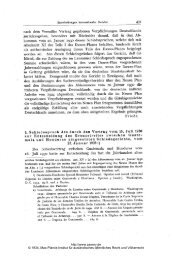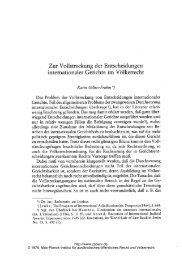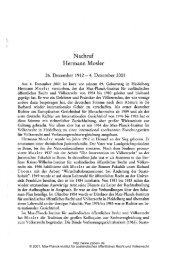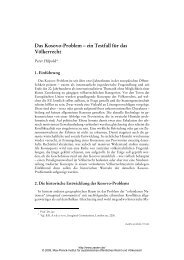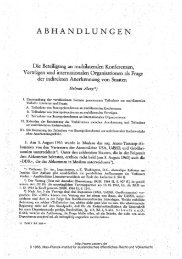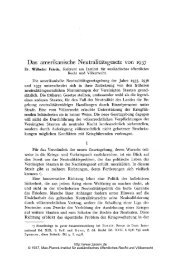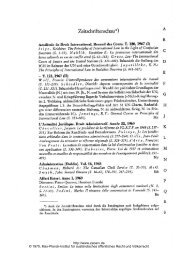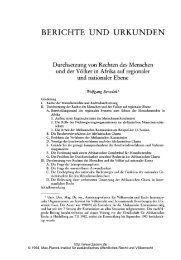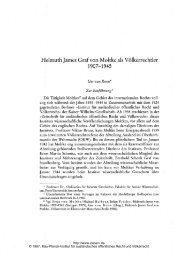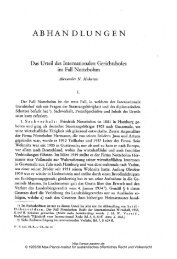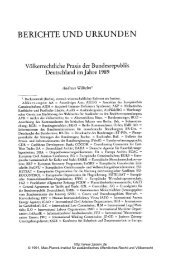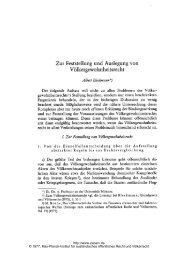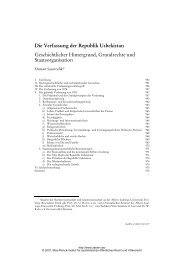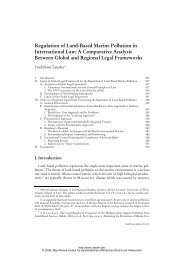bUe and Abuse of the Indian ConstitutionnD - Zeitschrift für ...
bUe and Abuse of the Indian ConstitutionnD - Zeitschrift für ...
bUe and Abuse of the Indian ConstitutionnD - Zeitschrift für ...
Create successful ePaper yourself
Turn your PDF publications into a flip-book with our unique Google optimized e-Paper software.
Use <strong>and</strong> <strong>Abuse</strong> <strong>of</strong> <strong>the</strong> <strong>Indian</strong>- Constitution 825if anyone <strong>of</strong> <strong>the</strong>m is not complied with, <strong>the</strong> detenu is released.112 Though unintended,this strict approach, enunciated in <strong>the</strong> name <strong>of</strong> protection <strong>of</strong> <strong>the</strong> dignity <strong>of</strong><strong>the</strong> individual, has helped criminals, especially economic <strong>of</strong>fenders, to go scot-freeon account <strong>of</strong> non-observance <strong>of</strong> procedural technicalitiesor minor lacunae inpresentation <strong>of</strong> materials. It is common knowledge that Government <strong>of</strong>ficialsdealing with detention are not well-versed in <strong>the</strong> ever-growing jurisprudence <strong>of</strong><strong>the</strong> -judiciary in this regard <strong>and</strong> lawyers engaged by detenus take advantage <strong>of</strong>some lapse or <strong>the</strong> o<strong>the</strong>r in <strong>the</strong> making <strong>of</strong> <strong>the</strong> detention order; <strong>the</strong> detaining authorityis not given an opportunity to cure <strong>the</strong> defect. The jurisprudence <strong>of</strong> <strong>the</strong> judiciaryshould be such that it helps <strong>the</strong> State in dealing with criminal elements effectively<strong>and</strong> not to base judgment in criminal cases solely on procedural technicalities.The Constitution (Forty-fourth Amendment) Act, 1978,113 amended article 359to make it clear that, even where a Proclamation <strong>of</strong> Emergency is in operation, <strong>the</strong>enforcement <strong>of</strong> articles 21 <strong>and</strong> 22 cannot be suspended, a positive developmentthat places human dignity above anything else <strong>and</strong> constitutes an im portant mi'le-stone in <strong>the</strong> constitutional history <strong>of</strong> India.(iii) Impact <strong>of</strong> international conventionsAttention may also be drawn to ano<strong>the</strong>r facet <strong>of</strong> <strong>the</strong> Court'sjurisprudence inrespect <strong>of</strong> <strong>the</strong> fundamental rights developed in PIL petitions. Visakha case114 involveda petition seeking suitable directions to prevent sexual harassment <strong>of</strong> workingwomen in all work places through judicial process. The Court found that sexualharassment violates <strong>the</strong> victim's fundamental right under article 19(l)(g) <strong>of</strong> <strong>the</strong>Constitution "to practice any pr<strong>of</strong>ession or to carry out any occupation, trade orbusiness" <strong>and</strong> this right depends on <strong>the</strong> availability <strong>of</strong> a "safe" environment, thatsuch harassment results in violation <strong>of</strong> <strong>the</strong> fundamental right <strong>of</strong> "gender equality"<strong>and</strong> <strong>the</strong> right to live with dignity as are assured by articles 14, 15 <strong>and</strong> 21 <strong>of</strong> <strong>the</strong>Constitution, that <strong>the</strong> primary responsibility for ensuring such safety <strong>and</strong> dignitythrough suitable legislation, <strong>and</strong> <strong>the</strong> creation <strong>of</strong> a mechanism for its enforcement,is <strong>of</strong> <strong>the</strong> Legislature <strong>and</strong> <strong>the</strong> Executive, <strong>and</strong> that an effective redressal requires thatsome guidelines should be laid down for <strong>the</strong> protection <strong>of</strong> <strong>the</strong>se rights to fill <strong>the</strong>legislative vacuum. The Court <strong>the</strong>n laid down certain guidelines <strong>and</strong> norms fordue observance at all work places in public as well as private sectors, until a legislationis enacted for <strong>the</strong> purpose. It said that <strong>the</strong>se guidelines would be binding<strong>and</strong> enforceable in law.112 See also Ram Krishna v. State <strong>of</strong> Delhi, AIR 1953 SC 318; Dwarika v. State <strong>of</strong> Bihar, AIR 1975SC 134; Bhupal v. Arif, AIR 1974 SC 255. For a general account <strong>of</strong> safeguards see B a s u'sCommentaryon <strong>the</strong> Constitution <strong>of</strong> -India, voll, 7th ed., 196 214.113This Act was enacted to overcome <strong>the</strong> decision <strong>of</strong> <strong>the</strong> Supreme Court in A.D.M. Jabalpur v.S. Shukla, AIR 1976 SC 1207.114Visakba v. State <strong>of</strong> Rajasthan (note 89).http://www.zaoerv.de© 1998, Max-Planck-Institut für ausländisches öffentliches Recht und Völkerrecht



